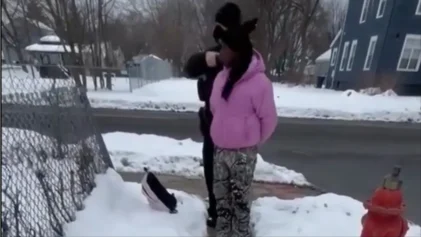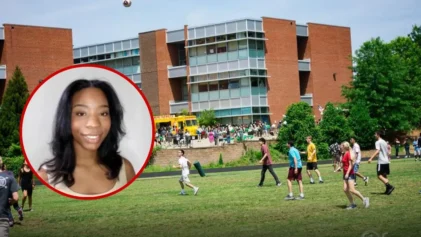CARACAS, Venezuela (AP) — Teams of heavily armed security agents seized two of Venezuela’s top opposition leaders from their homes in the middle of the night Tuesday, dragging one into the street in his pajamas as President Nicolas Maduro’s government defied U.S. sanctions and international condemnation of a plan to assume nearly unlimited powers.
Leopoldo Lopez and Antonio Ledezma were being held at the Ramo Verde military prison south of the capital, accused by the government-allied Supreme Court of violating the terms of their house arrest by plotting to escape and releasing video statements criticizing Maduro.
Both men’s allies denied the charges and vowed to continue to try to push the ruling party from power. But they gave little indication of how they planned to do that, and the capital was unusually quiet after months of sometimes violent protests. While the United States and some Latin American allies condemned the arrests, many other nations and international organizations were silent or limited themselves to expressions of concern.
Lopez’s supporters released a video he taped last week saying he expected to be imprisoned again soon, and calling on Venezuelans to be firm in resisting Maduro.
“If you are looking at this video now, it’s precisely because that occurred, because they came and they illegally imprisoned me again unjustly, a prisoner of consciousness, a prisoner for my ideas, a prisoner for wanting a better Venezuela,” the 46-year-old Lopez said.
He also said that his wife, Lilian Tintori, is pregnant, touching her belly and saying he has “one more reason to fight for Venezuela.” He called the pregnancy “the best news I’ve received in the last 3 1/2 years” — the time he spent behind bars before being released to house arrest last month. The couple had been allowed some conjugal visits.
Maduro appeared undeterred in his plans to seat a special assembly this week with powers to rewrite the country’s constitution and override any other branch of the Venezuelan government. He has threatened to use those powers to go after his opponents and the arrests Tuesday appeared to show he was willing to proceed with full force.
Maduro appears to have the full support of the country’s most important institutions.
Venezuela’s powerful vice president, whom the U.S. has accused of drug trafficking, said the newly elected constituent assembly would be convening “within hours.”
In remarks aired on Venezuela’s state television, Tareck El Aissami said that results from Sunday’s election have been reviewed and the 545 assembly members would soon take the reins of the nation’s government. He didn’t give a specific time.
Venezuela’s defense minister, Gen. Vladimir Padrino Lopez, also appeared on television Tuesday to affirm his loyalty to Maduro.
“We ask for respect for our democracy, for the way in which we have decided to take the road that we deserve to take in peace, in democracy, with tolerance, without violence and without heading toward a coup,” Padrino said.
Lopez was released from the Ramo Verde prison on July 8 after serving three years of a 13-year sentence on charges of inciting violence at opposition rallies. Many human rights groups considered him a political prisoner.
Ledezma, 62, was also detained in 2015 and has been under house arrest. Like Lopez, he also recently posted a video denouncing Sunday’s vote.
Shortly after midnight, black-clad members of Venezuela’s state security force forced Ledezma from his east Caracas home in his blue pajamas, yanking him out into the night as a woman screamed for help.
“They’re taking Ledezma!” the woman can be heard crying on a cell-phone video released by Ledezma’s allies. “It’s a dictatorship!”
Lopez’s wife posted security-camera video of him being taken from their home and bundled into a waiting car.
“They’ve just taken Leopoldo from the house,” Tintori wrote on Twitter. “We don’t know where he is or where they’re taking him.”
Attorney Juan Carlos Gutierrez said the government’s decision to return Lopez to prison was “completely arbitrary” and said Lopez had obeyed the conditions imposed on his house arrest and never had plans to flee.
Tensions escalated in Venezuela after government-allied electoral authorities said more than 8 million people voted Sunday and the turnout was disputed by the opposition and independent analysts and condemned by many nations in the region and beyond.
On Monday, the Trump administration added Maduro to a growing list of high-ranking Venezuelan officials targeted by financial sanctions. For now, the Trump administration has not delivered on threats to sanction Venezuela’s oil industry, which could undermine Maduro’s government but also raise U.S. gas prices and deepen the humanitarian crisis in Venezuela.
Maduro said Monday evening he had no intention of deviating from his plans to rewrite the constitution and go after a string of enemies, from independent Venezuelan news channels to gunmen he claimed were sent by neighboring Colombia to disrupt the vote as part of an international conspiracy led by the man he calls “Emperor Donald Trump.”
Maduro has also said he would use the assembly’s powers to bar opposition candidates from running in gubernatorial elections in December unless they sit with his party to negotiate an end to hostilities that have generated four months of protests, leaving least 120 dead and nearly 2,000 wounded.
U.S. Secretary of State Rex Tillerson said Tuesday that the Trump administration was “evaluating all of our policy options as to what can we do to create a change of conditions where either Maduro decides he doesn’t have a future, and wants to leave of his own accord, or we can return the government processes back to their constitution.”
Later, the White House issued a statement condemning “the Maduro dictatorship” over the arrests and saying Lopez and Ledezma are political prisoners.
“The United States holds Maduro — who publicly announced just hours earlier that he would move against his political opposition — personally responsible for the health and safety of Mr. Lopez, Mr. Ledezma, and any others seized,” the White House said.
Panamanian and Argentine officials and the Organization of American States condemned Tuesday’s arrests, though other nations in the region were silent. A spokesman for U.N. Secretary-General Antonio Guterres said he “has taken note” of the jailings and was sending “an overall message of concern for the increase in political tensions and the country moving away from a path to finding a peaceful solution.”
The French, British, Spanish and Mexican ambassadors to Venezuela visited the opposition-controlled National Assembly on Tuesday and met with legislators as a show of support. After they left, members of pro-government motorcycle gangs surrounded the building and some threw rocks and tomatoes at a legislator and another person as they left the building. Three legislators said they were breaking with the pro-government Great Patriotic Pole party and forming a new faction opposed to rewriting the constitution.
Maduro called the vote for the constitutional assembly in May after weeks of protests against his government, which has overseen Venezuela’s descent into a devastating crisis during its four years in power. Due to plunging oil prices and widespread corruption and mismanagement, Venezuela’s inflation and homicide rates are among the world’s highest, and widespread shortages of food and medicine have left citizens dying of preventable illnesses and rooting through trash to feed themselves.


